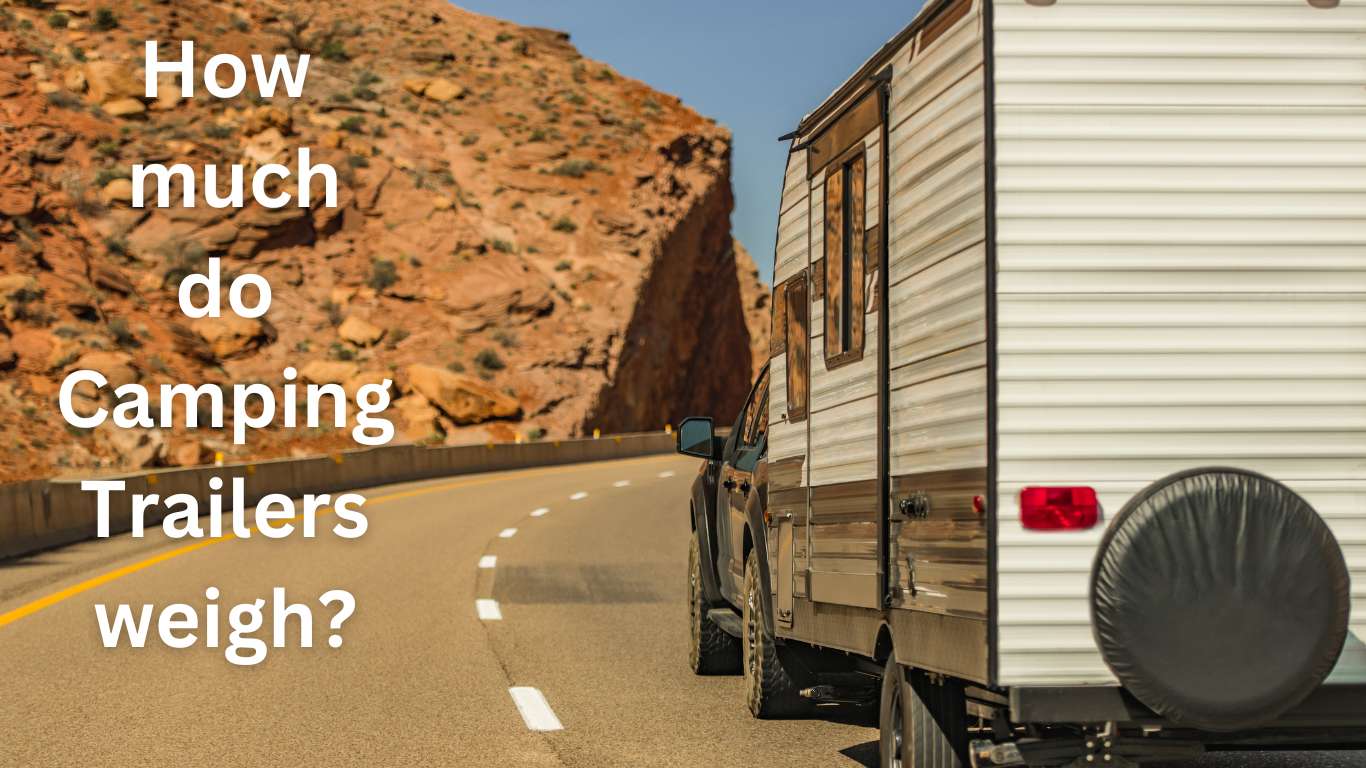When planning a camping trip, understanding how much camping trailers weigh is essential. Trailer weight directly impacts towing capacity, fuel efficiency, and the overall ease of handling. Let’s dive into the different types of camping trailers and their average weights to help you make an informed decision.
Lightweight Camping Trailers
Lightweight camping trailers are ideal for small vehicles or those seeking easy towing. Their compact design doesn’t compromise comfort.
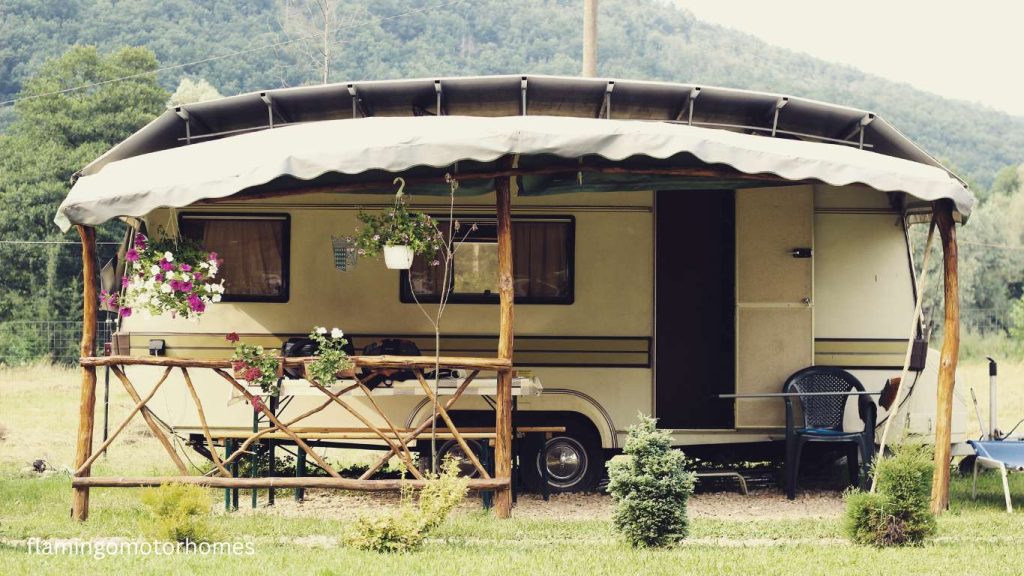
Average Weight:
- Teardrop Trailers: 500 to 1,500 lbs
- Pop-Up Campers: 1,000 to 3,000 lbs
Key Features:
- Easy to tow with SUVs or sedans.
- Perfect for solo travelers or couples.
Mid-Sized Camping Trailers
For families or groups, mid-sized camping trailers strike a balance between comfort and towability.
Average Weight:
- Travel Trailers: 4,000 to 8,000 lbs
- Hybrid Trailers: 3,000 to 6,000 lbs
Key Features:
- Suitable for mid-sized trucks or SUVs.
- Offer spacious interiors and amenities.
Heavyweight Camping Trailers
Designed for luxury and extended stays, heavyweight camping trailers deliver maximum comfort but require powerful towing vehicles.
Average Weight:
- Fifth-Wheel Trailers: 7,000 to 20,000 lbs
- Toy Haulers: 5,000 to 15,000 lbs
Key Features:
- Requires large trucks for towing.
- Ideal for full-time RVers or those traveling with additional gear.
Why Knowing Your Trailer’s Weight Matters
Understanding how much camping trailers weigh helps you choose the right vehicle and ensures safe travel. Overloading your trailer can lead to mechanical issues, reduced fuel efficiency, and safety hazards.
By knowing how much camping trailers weigh, you can confidently choose the perfect option for your adventures. From lightweight options to luxurious heavyweight models, there’s a trailer for everyone. Keep these weights in mind to ensure a stress-free and enjoyable camping experience!
How to Find the Weight of a Camper Trailer
Knowing the exact weight of your camper trailer is essential for safe towing and vehicle compatibility. Here’s a step-by-step guide to determine the weight of a camper trailer with an example for better understanding.
Step-by-Step Method to Find Camper Trailer Weight
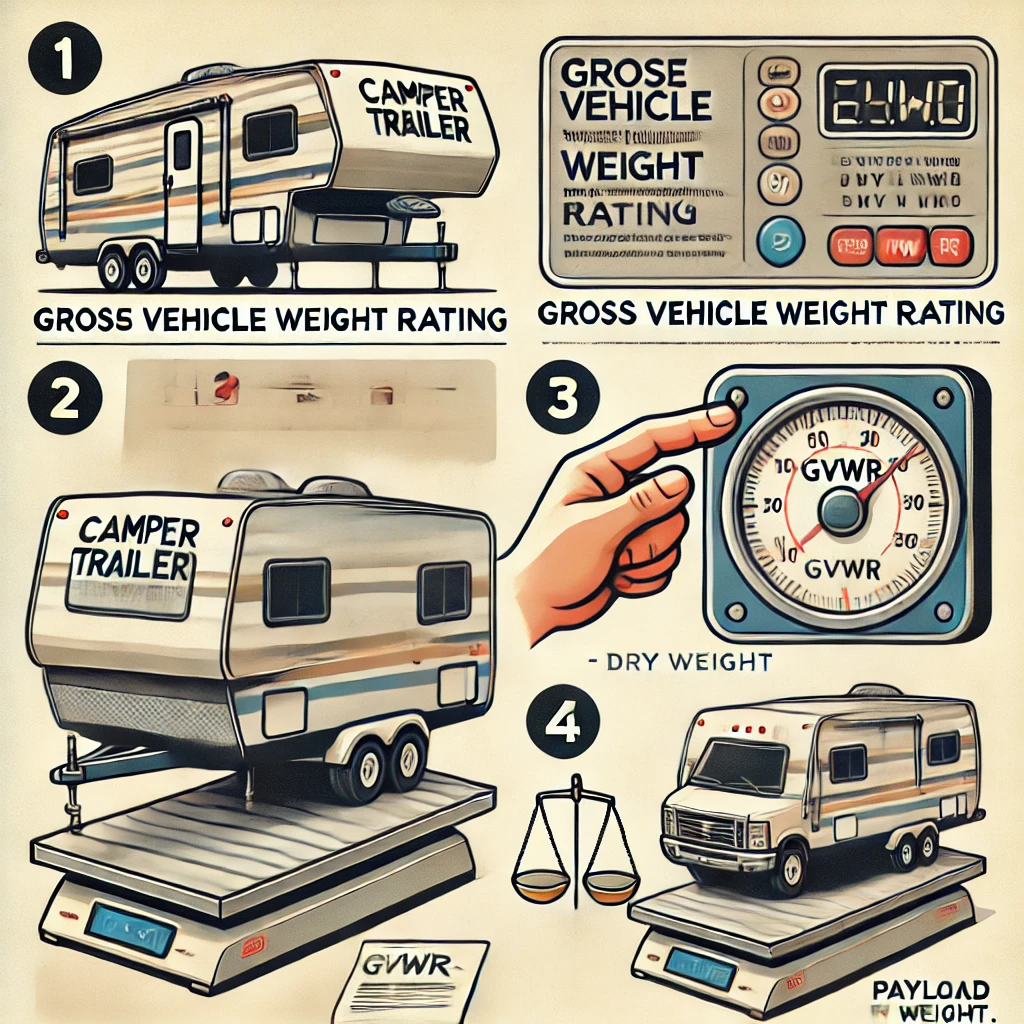
Step 1: Locate the Manufacturer’s Label
Most camper trailers have a manufacturer’s label or data plate, usually located near the doorframe or hitch. This label includes essential weight data:
- Dry Weight (UVW): The weight of the trailer without any cargo, water, or propane.
- Gross Vehicle Weight Rating (GVWR): The maximum allowable weight, including cargo, water, and passengers.
Step 2: Weigh at a Certified Scale
To get the most accurate measurement, visit a certified public weigh station or truck stop. Use the scale to measure:
- Trailer Axle Weight: Drive the trailer onto the scale.
- Tongue Weight: Weigh the portion resting on the hitch (separately, if needed).
Step 3: Calculate the Total Weight
Add the axle weight and tongue weight for the trailer’s total weight.
Example: Finding the Weight of a Travel Trailer
Imagine you own a travel trailer. Here’s how you’d find its weight:
- The manufacturer’s label lists:
- Dry Weight (UVW): 4,500 lbs
- GVWR: 7,000 lbs
- You head to a weigh station and find:
- Axle Weight: 5,200 lbs
- Tongue Weight: 500 lbs
- Calculate the total weight:
5,200 lbs (Axle Weight) + 500 lbs (Tongue Weight) = 5,700 lbs
In this example, the actual weight of the trailer is 5,700 lbs, which is within the GVWR.
Why This Matters
Accurately measuring the weight of a camper trailer ensures:
- Your towing vehicle can handle the load.
- You stay within legal weight limits.
- A safe and efficient towing experience.
What Are the Different Essential Weights That Affect a Camper Trailer?
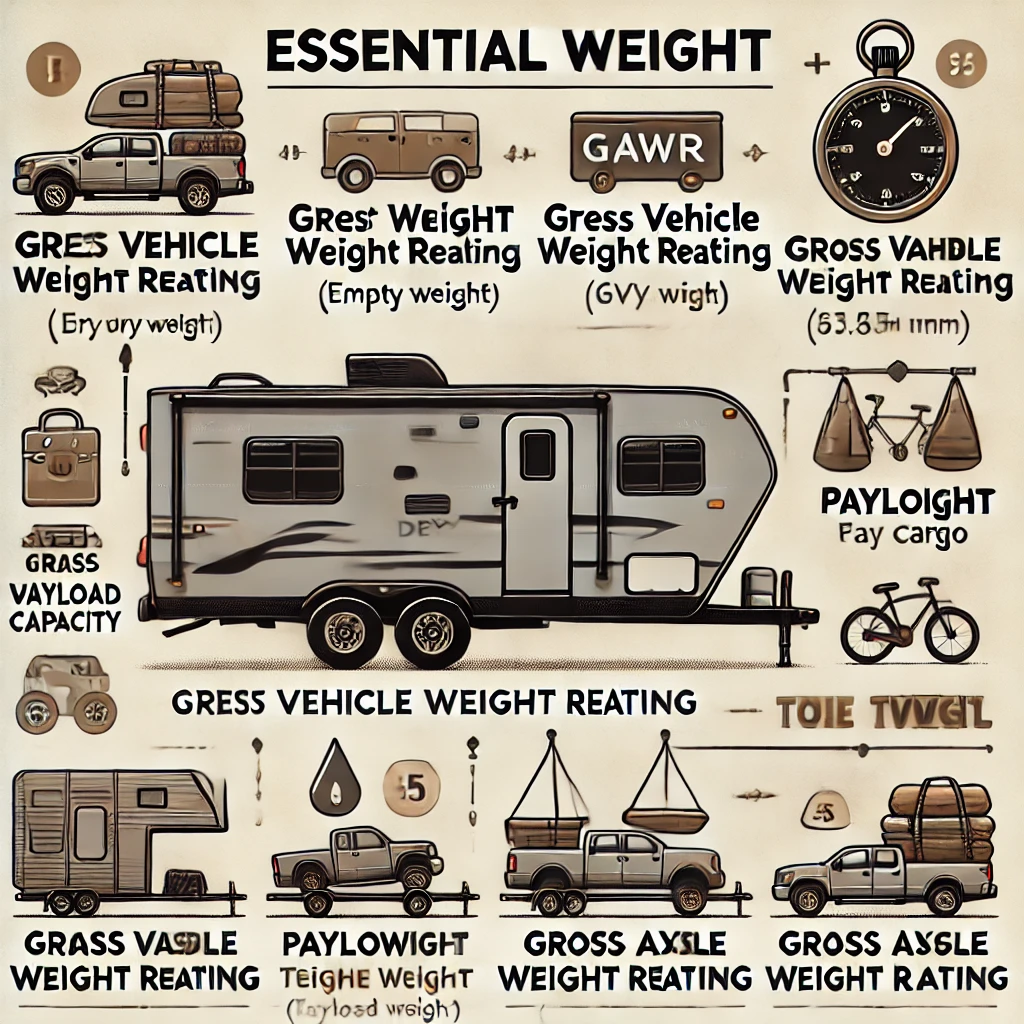
Understanding the essential weights that affect a camper trailer is critical for safe towing and optimal performance. Each type of weight plays a unique role in determining how your trailer interacts with your towing vehicle and the road.
Key Types of Camper Trailer Weights
1. Dry Weight (Unloaded Vehicle Weight – UVW)
Dry weight refers to the weight of the camper trailer as manufactured, without any cargo, passengers, water, or propane.
Importance:
- A baseline weight for calculating the total load.
- Helps determine if your towing vehicle is capable of handling the trailer.
2. Gross Vehicle Weight Rating (GVWR)
GVWR is the maximum weight the camper trailer can safely carry, including the dry weight, cargo, water, propane, and passengers.
Importance:
- Exceeding this weight can damage the trailer and compromise safety.
- It’s a critical factor when packing for a trip.
3. Tongue Weight
Tongue weight is the portion of the trailer’s weight that rests on the hitch of the towing vehicle.
Recommended Range:
- 10% to 15% of the trailer’s total weight.
Importance:
- Too little tongue weight can cause swaying.
- Too much tongue weight can overload the rear axle of the towing vehicle.
4. Cargo Weight (Payload)
Cargo weight includes everything added to the trailer after manufacturing, such as personal items, food, camping gear, and optional upgrades.
Importance:
- Must be distributed evenly to avoid imbalance.
- Directly affects the trailer’s total weight.
5. Water Weight
Freshwater, gray water, and black water tanks significantly impact the total weight. A gallon of water weighs approximately 8.34 lbs, so full tanks can add hundreds of pounds.
Importance:
- Consider filling water tanks closer to your destination to reduce towing weight.
How These Weights Work Together
Let’s look at an example for a camper trailer with a GVWR of 7,000 lbs:
- Dry Weight: 4,500 lbs
- Cargo Weight: 1,000 lbs
- Water Weight (40 gallons): 333 lbs
- Tongue Weight: 700 lbs (approximately 10% of GVWR)
Total weight = 6,533 lbs, which is within the GVWR.
Why Understanding Essential Weights Matters
Managing the essential weights that affect a camper trailer helps:
- Prevent overloading and potential accidents.
- Maintain towing vehicle efficiency.
- Ensure legal compliance on the road.
What Is the Average Weight of a Camper Trailer?
Understanding the average weight of a camper trailer is crucial for safe and efficient travel. The weight varies depending on the size, type, and features of the camper, but having a general idea helps you plan your trips better.
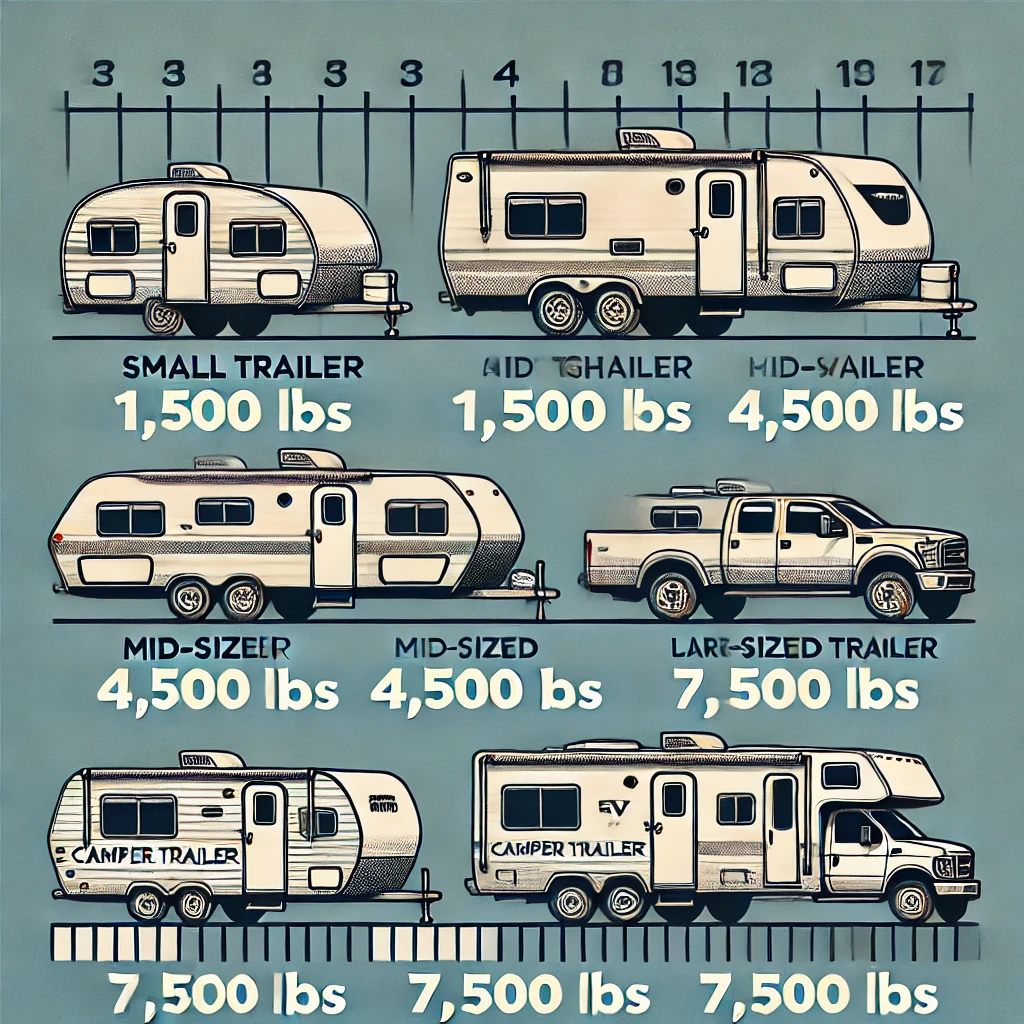
Average Weight of Different Camper Trailers
Here’s a breakdown of the average weight for popular camper trailer types:
Lightweight Campers
- Teardrop Trailers: 500 to 1,500 lbs
- Pop-Up Campers: 1,000 to 3,000 lbs
Mid-Sized Campers
- Travel Trailers: 4,000 to 8,000 lbs
- Hybrid Campers: 3,000 to 6,000 lbs
Heavyweight Campers
- Fifth-Wheel Trailers: 7,000 to 20,000 lbs
- Toy Haulers: 5,000 to 15,000 lbs
| Camper Trailer Type | Average Weight (lbs) | Payload Capacity (lbs) | Suitable Towing Vehicle |
|---|
| Pop-Up Camper | 1,000 – 3,000 | 700 – 1,200 | Small SUVs, Crossovers |
| Travel Trailer | 3,000 – 10,000 | 1,500 – 3,000 | Midsize SUVs, Trucks |
| Fifth-Wheel Trailer | 10,000 – 15,000 | 3,000 – 4,500 | Heavy-Duty Trucks |
| Teardrop Trailer | 500 – 1,500 | 500 – 800 | Compact Cars, Small SUVs |
| Toy Hauler | 7,000 – 13,000 | 4,000+ | Heavy-Duty Trucks |
The Overall Average Weight
In general, the average weight of a camper trailer falls between 2,000 and 7,000 lbs, including the base weight and additional gear. This range depends on whether the camper is lightweight, mid-sized, or heavyweight.
Why Knowing the Weight Matters
Knowing the average weight of a camper trailer is essential for choosing the right towing vehicle, ensuring safety, and maintaining fuel efficiency. Overloading can strain your vehicle and compromise safety.
Final Thoughts
Whether you’re towing a lightweight teardrop or a heavyweight fifth-wheel, understanding the average weight of a camper trailer ensures a smooth journey. Always check your vehicle’s towing capacity and follow recommended weight limits to enjoy your adventures worry-free!
Where Can You Weigh Your Camper Trailer?
Knowing where to weigh your camper trailer is crucial for ensuring safe towing and compliance with weight limits. Fortunately, there are several options available to get an accurate measurement.
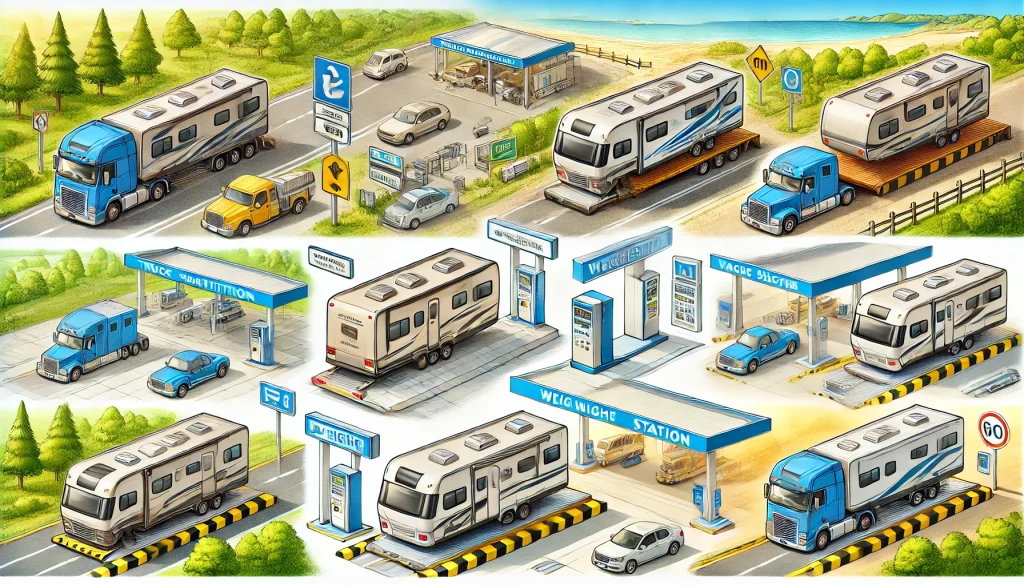
Places to Weigh Your Camper Trailer
1. Public Weigh Stations
Public weigh stations are commonly found along highways and are designed for trucks and trailers. Many states allow recreational vehicles to use these facilities.
Key Features:
- Accurate measurements.
- Often free or low-cost.
How to Locate:
- Search for “public weigh stations near me” online.
- Use apps or GPS tools designed for RVers.
2. Truck Stops with Certified Scales
Truck stops, such as those operated by CAT Scale, offer certified scales specifically for large vehicles and trailers.
Advantages:
- Nationwide availability.
- Reliable and easy to use.
Cost:
- Typically $10–$15 per weigh.
3. Landfills or Recycling Centers
Many landfills and recycling centers have scales for weighing vehicles and trailers.
Considerations:
- Call ahead to confirm availability.
- May have weight limits or specific hours.
4. RV Dealerships or Service Centers
Some RV dealerships and service centers provide weighing services for camper trailers.
Benefits:
- Specialized knowledge of RV weights.
- Additional maintenance services may be available.
5. Portable Weigh Pads
Portable weigh pads are a convenient option if you want to weigh your camper trailer at home. These are sold online or at RV supply stores.
Features:
- Easy to use.
- Useful for frequent checks.
Example of Weighing Your Camper Trailer
Let’s say you’re traveling with a 5,000-lb travel trailer. You stop at a CAT Scale at a nearby truck stop:
- Drive onto the scale.
- Follow the instructions to weigh your trailer and towing vehicle.
- Receive a detailed weight report showing axle, tongue, and total weights.
Why Weighing Your Camper Trailer Matters
Knowing where to weigh your camper trailer ensures accurate weight management. This helps you:
- Prevent overloading and damage.
- Stay compliant with towing regulations.
- Improve fuel efficiency and safety.
Impact of Camper Trailer Weight on Stability, Handling, Brakes, and Other Elements
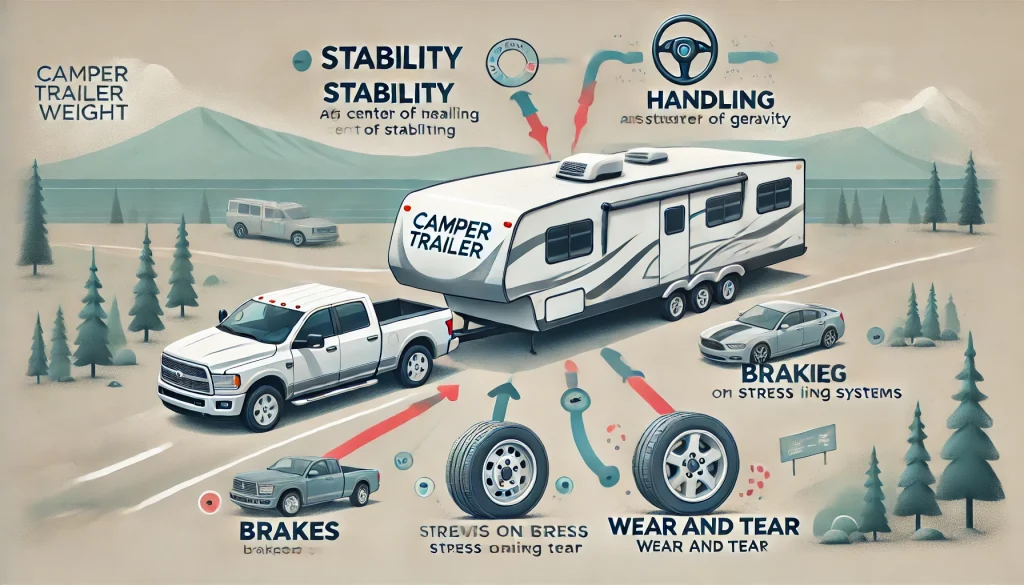
The weight of a camper trailer significantly influences your vehicle’s performance, safety, and ease of towing. Improper weight distribution or excessive load can compromise critical aspects like stability, handling, and braking. Here’s how these factors are affected and what you can do to mitigate risks.
Stability
Impact:
- Uneven or excessive weight causes trailer sway, especially at high speeds or during sudden maneuvers.
- Improper tongue weight (too light or too heavy) reduces stability, leading to unsafe driving conditions.
Solutions:
- Balance Weight: Ensure cargo is evenly distributed across the trailer.
- Adjust Tongue Weight: Keep tongue weight at 10–15% of the trailer’s total weight.
- Use Sway Control Devices: Install weight-distribution hitches or anti-sway bars to enhance stability.
Handling
Impact:
- Overloading affects your ability to steer and maneuver effectively, especially in tight turns.
- Poor weight distribution can cause the trailer to pull or push the towing vehicle unevenly.
Solutions:
- Practice Turning: Take wider turns to accommodate the trailer.
- Keep Trailer Level: Use an adjustable hitch to keep the trailer level for optimal handling.
- Reduce Speed: Drive at moderate speeds to maintain control, especially on curves or inclines.
Brakes
Impact:
- Extra weight increases stopping distances, putting more strain on both the towing vehicle’s and trailer’s brakes.
- Overheating or failing brakes are common when descending steep grades with an overloaded trailer.
Solutions:
- Install Trailer Brakes: Use electric or hydraulic brakes on the trailer for added stopping power.
- Check Brake Function: Inspect and service brakes regularly.
- Drive Conservatively: Allow for longer stopping distances and avoid abrupt braking.
Tires
Impact:
- Overloaded or unbalanced trailers cause uneven tire wear, blowouts, and reduced traction.
- Incorrect tire pressure further compromises handling and fuel efficiency.
Solutions:
- Maintain Proper Pressure: Inflate tires to the recommended PSI.
- Check for Wear: Regularly inspect tires for damage or wear.
- Upgrade Tires: Use heavy-duty tires rated for the trailer’s load capacity.
Fuel Efficiency
Impact:
- Heavier loads increase wind resistance and fuel consumption.
- Improperly loaded trailers exacerbate fuel inefficiency.
Solutions:
- Minimize Load: Only carry essentials to reduce weight.
- Streamline Packing: Secure cargo to minimize aerodynamic drag.
Suspension and Axles
Impact:
- Excess weight or poor distribution puts strain on the trailer’s suspension and axles, leading to premature wear or failure.
Solutions:
- Inspect Suspension: Check leaf springs, shocks, and axles for signs of wear.
- Follow GVWR Limits: Avoid exceeding the trailer’s gross vehicle weight rating.
Towing Vehicle Performance
Impact:
- Overloading the trailer or mismanaging weight increases engine strain, reduces acceleration, and may lead to overheating.
- Poor trailer setup can affect the towing vehicle’s stability and handling.
Solutions:
- Use the Right Vehicle: Match your towing vehicle’s capacity with the trailer’s weight.
- Upgrade Tow Package: Consider adding a transmission cooler or heavier-duty suspension to your vehicle.
Lights and Electrical Systems
Impact:
- Excess weight can damage trailer wiring or connections, causing lights to malfunction.
Solutions:
- Inspect Connections: Check electrical connections before every trip.
- Use LED Lights: Upgrade to energy-efficient LED lighting to reduce strain on the system.
Why Proper Weight Management Matters
Improper weight management impacts every aspect of towing, from stability and braking to fuel efficiency and vehicle longevity. By understanding how weight affects stability, handling, brakes, and other elements, you can make adjustments to ensure safer, more efficient towing.
Always prioritize safety by staying within weight limits, distributing cargo evenly, and maintaining all towing components. Your camper trailer experience will be much smoother and stress-free!
How Different Camper Trailers Are Affected by Weight
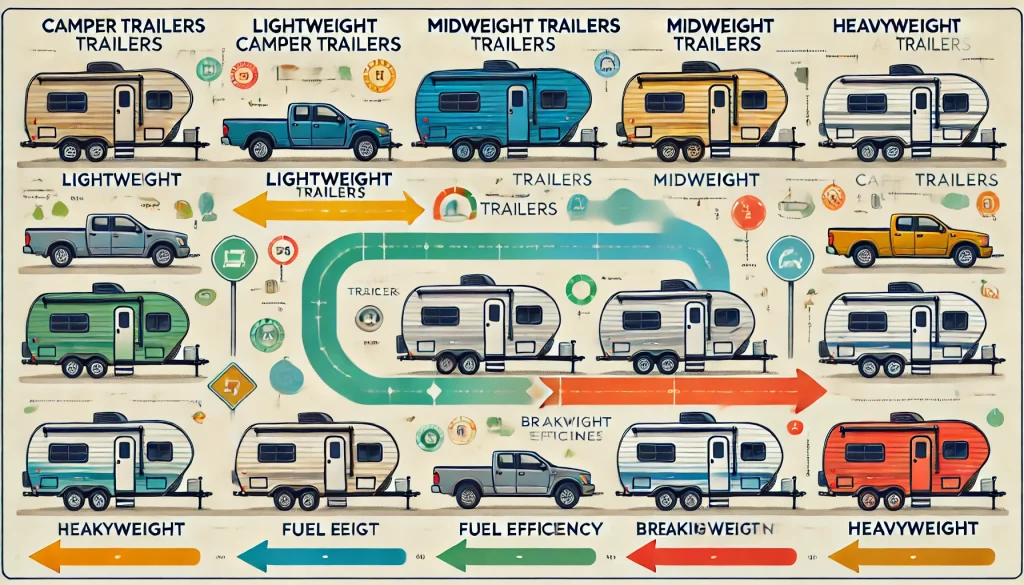
Camper trailer weight plays a crucial role in determining performance, fuel efficiency, and safety. Understanding how various types of camper trailers handle weight and their respective capacities is essential for making the right choice. Let’s break it down by trailer type
1. Pop-Up Camper Trailers and Weight
Lightweight Design for Easy Towing
Pop-up camper trailers are among the lightest options, typically weighing between 1,000 to 3,000 pounds. Their compact build makes them easy to tow with smaller vehicles, but exceeding their weight capacity can:
- Increase wear on suspension systems.
- Decrease fuel efficiency.
Weight Capacity Considerations
The average pop-up camper can handle an additional 700 to 1,200 pounds of gear. Distributing weight evenly inside is vital to maintain stability during transit.
2. Travel Trailers and Weight
Medium Weight with Versatile Options
Travel trailers range widely in weight, from 3,000 to 10,000 pounds, depending on size and features. Their weight makes them suitable for mid-size SUVs or trucks, but improper weight management may:
- Lead to swaying on the road.
- Put strain on your towing vehicle.
Capacity Limits
Most travel trailers have a payload capacity of 1,500 to 3,000 pounds, allowing for considerable customization. Ensure that the trailer tongue weight stays within 10-15% of the gross weight for optimal towing.
3. Fifth-Wheel Trailers and Weight
Heavyweight for Spacious Living
Fifth-wheel trailers are among the heaviest, with weights ranging from 10,000 to 15,000 pounds. This substantial weight requires a robust truck with a fifth-wheel hitch. If overloaded, these trailers can:
- Compromise braking systems.
- Cause excessive wear on towing vehicles.
Weight Handling Capabilities
These trailers can typically accommodate an additional 3,000 to 4,500 pounds, making them ideal for extended trips with significant cargo. Always verify axle weight ratings to prevent overloading.
4. Teardrop Trailers and Weight
Ultra-Lightweight and Minimalistic
Teardrop trailers are incredibly lightweight, often weighing 500 to 1,500 pounds. Their small size makes them perfect for compact cars. However, overloading these trailers can:
- Impact maneuverability.
- Reduce fuel efficiency.
Capacity Insights
Teardrop trailers generally support a modest payload of 500 to 800 pounds. Given their size, careful planning of storage is essential to avoid tipping issues.
5. Toy Haulers and Weight
Heavyweights with Dual Purpose
Toy haulers are designed for carrying gear and recreational vehicles, with weights ranging from 7,000 to 13,000 pounds. Overloading toy haulers may:
- Increase tire wear.
- Compromise the structural integrity of the cargo area.
Generous Load Capacities
With payload capacities often exceeding 4,000 pounds, toy haulers provide flexibility. However, always distribute the weight of heavy equipment towards the axle for improved balance.
Final Thoughts on Camper Trailer Weight
Weight management is a critical factor for every camper trailer type. Always consider the gross vehicle weight rating (GVWR) and adhere to payload limits to ensure safety and efficiency. Whether you’re towing a lightweight pop-up camper or a hefty fifth-wheel trailer, proper weight distribution is the key to a smooth journey.
Common Mistakes When Using a Camper Trailer and Their Solutions
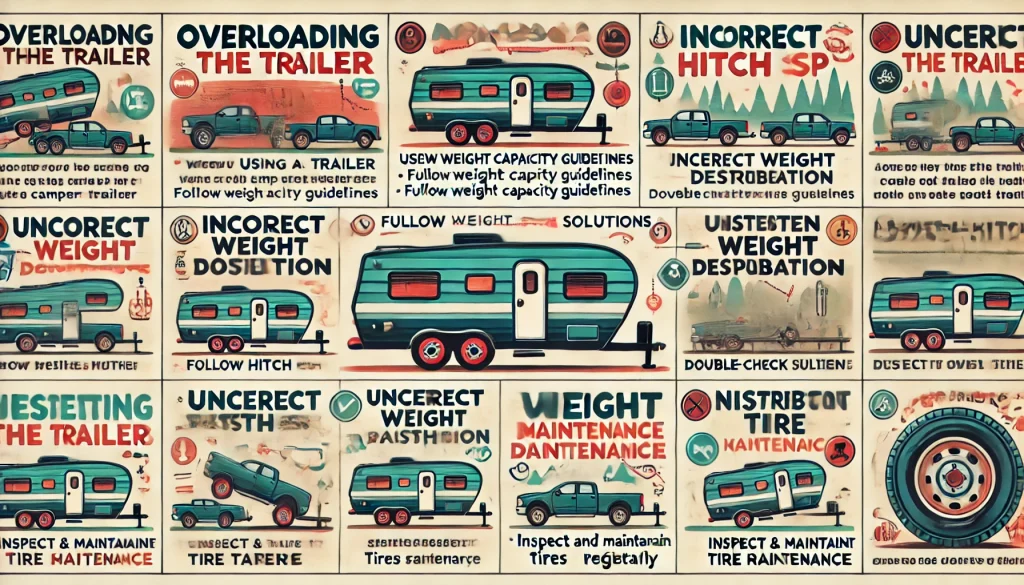
Owning a camper trailer can be exciting, but there are several common mistakes that can lead to costly repairs, safety hazards, or an uncomfortable trip. Here’s a look at these issues and how to avoid them.
Common Mistake 1: Overloading the Camper Trailer
Why It Happens:
Many owners underestimate the weight of their cargo, water tanks, and gear, exceeding the trailer’s Gross Vehicle Weight Rating (GVWR).
Solution:
- Weigh the Trailer: Use a certified scale to check your total weight.
- Distribute Weight Evenly: Balance the load to avoid trailer sway.
- Follow Weight Limits: Never exceed your vehicle’s towing capacity or the trailer’s GVWR.
Common Mistake 2: Neglecting Trailer Maintenance
Why It Happens:
Routine checks are often overlooked, leading to problems like brake failure, worn tires, or leaking seals.
Solution:
- Inspect Regularly: Check brakes, tires, lights, and seals before every trip.
- Service Annually: Schedule professional maintenance once a year.
- Tire Care: Maintain proper tire pressure and inspect for wear.
Common Mistake 3: Improper Hitch Setup
Why It Happens:
Using an incorrect hitch or failing to secure it properly can cause instability or even detachment.
Solution:
- Use a Weight-Rated Hitch: Match the hitch to your trailer’s GVWR.
- Double-Check Connections: Ensure the hitch, safety chains, and electrical connections are secure.
- Level the Trailer: Use a hitch that keeps the trailer level for better control.
Common Mistake 4: Ignoring Weight Distribution
Why It Happens:
Poor weight distribution can lead to trailer sway, which is dangerous at high speeds.
Solution:
- Balance Cargo: Place heavier items near the center of the trailer.
- Adjust Tongue Weight: Ensure tongue weight is 10–15% of the trailer’s total weight.
- Install Sway Control: Consider sway bars for added stability.
Common Mistake 5: Forgetting to Secure Items Inside
Why It Happens:
Loose items inside the trailer can shift during transit, causing damage or creating hazards.
Solution:
- Use Storage Solutions: Secure items in cabinets or with straps.
- Lock Doors and Drawers: Prevent them from opening while on the road.
- Avoid Overloading: Don’t cram items into spaces that may shift during travel.
Common Mistake 6: Overlooking Local Towing Laws
Why It Happens:
Travelers often assume towing laws are universal, leading to violations.
Solution:
- Research Regulations: Check speed limits, lane restrictions, and brake requirements for each state or country.
- Follow Safety Standards: Ensure lights, safety chains, and reflectors meet legal requirements.
Common Mistake 7: Forgetting Pre-Trip Checks
Why It Happens:
Eagerness to start the journey can lead to skipping important inspections.
Solution:
- Create a Checklist: Include tires, lights, brakes, hitch, and cargo.
- Test Drive: Take a short drive to confirm stability and handling.
- Verify Documents: Ensure registration, insurance, and roadside assistance details are current.
Why Avoiding These Mistakes Matters
Avoiding these common mistakes ensures:
- Safer and smoother travel.
- Prolonged lifespan of your camper trailer.
- Peace of mind on every trip.
Laws and Regulations for Camper Trailers
Towing a camper trailer comes with responsibilities, including adhering to the laws and regulations for camper trailers. These rules vary by location but are essential to ensure safety and compliance.
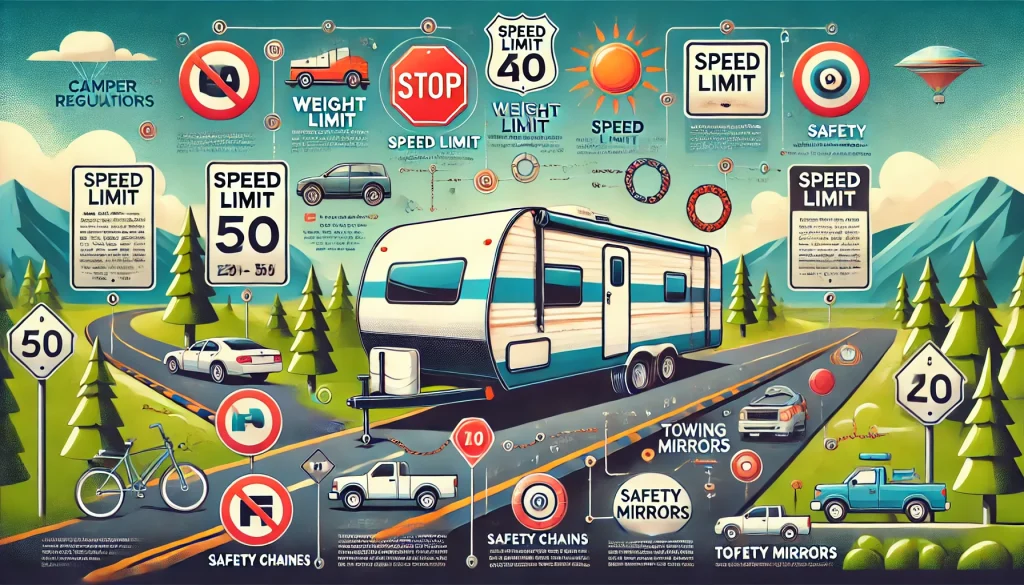
Key Laws and Regulations for Camper Trailers
1. Weight Limits and Towing Capacity
- Gross Vehicle Weight Rating (GVWR): Ensure your trailer’s weight (including cargo and water) does not exceed its GVWR.
- Towing Capacity: Verify that your vehicle’s towing capacity is greater than the trailer’s total weight.
Why It Matters: Overloading can lead to mechanical failures, reduced control, and legal penalties.
2. Trailer Braking Laws
- Trailers over a specific weight (typically 3,000 lbs) must have their own braking system.
- Some states require breakaway brakes, which engage automatically if the trailer detaches.
Tip: Check your state’s specific weight threshold for brake requirements.
3. Hitch and Safety Chains
- A proper hitch rated for the trailer’s weight is mandatory.
- Safety chains must be used to secure the trailer to the towing vehicle as a backup connection.
Why It Matters: These ensure the trailer stays attached, even in case of a hitch failure.
4. Trailer Lighting and Reflectors
- All trailers must have functional lights, including brake lights, turn signals, and running lights.
- Reflectors or reflective tape are required for visibility at night.
Regulation Note: The lighting system must comply with DOT (Department of Transportation) standards in the U.S.
5. Speed Limits and Lane Restrictions
- Many states impose lower speed limits for vehicles towing trailers.
- Some highways restrict trailers to specific lanes.
Example: In California, trailers must stay in the right lane on multi-lane highways.
6. Licensing and Permits
- A regular driver’s license is sufficient for most camper trailers under a certain weight.
- Heavier trailers may require a special license or endorsement.
Example: A Class A or B license may be necessary for trailers exceeding 10,000 lbs in some states.
How to Stay Compliant
- Research Local Laws: Towing regulations vary by state or country. Always check the rules before traveling.
- Inspect Equipment: Regularly inspect your hitch, brakes, lights, and safety chains to ensure they meet legal requirements.
- Carry Documentation: Keep your vehicle registration, insurance, and trailer’s weight details handy.
Why Laws and Regulations Matter
Following the laws and regulations for camper trailers ensures:
- Safer travels for you and other road users.
- Avoidance of fines and legal issues.
- A smoother, stress-free towing experience.
More related details will be available on Flamingo Motorhomes

